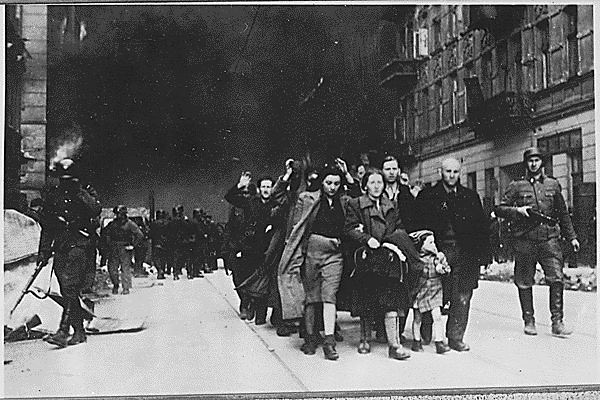Judy Batalion’s “The Light of Days” is a riveting and heartbreaking tale of WWII’s forgotten heroes

Jewish civilians march during the 1943 destruction of the Warsaw Ghetto. This event was created and organized by hundreds of women involved in the Jewish resistance.
October 14, 2021
In all honesty, nonfiction has never been my thing. Memoirs, biographies, autobiographies all seemed the same to me. Boring, drawling accounts of remarkable (and some unremarkable) people with no clear plot. Just simple information dumps.
That was simply how I treated the genre – a chore. That was, until I picked up “The Light of Days” in an East Hampton bookstore over the summer. I was drawn to the bright red, thick book that stood before me on the shelf that I had to stand on my tippy-toes to reach. What also caught my eye was the picture of a young woman in a seemingly expensive wool coat and purse. She looked distinguished – defiant, even.
Reading the first few pages immediately dragged me into a tense conversation between one of the Jewish resistance groups during the holocaust. The main question was: fight, or flight?
They were nicknamed the “ghetto girls” but that label does not even begin to describe the fierce, calculated spirit of mostly forgotten Eastern European Jewish women in their teens and early 20s who, in retaliation against the Nazis, foiled German plans for the Holocaust and were on a mission to save as many Jewish lives as possible.
Now, in the well-researched and punctilious “The Light of Days,” Batalion does not let a single story or event slip through her fingers. She brings the bravery and hutzpah of these heroines to the forefront, through the meticulous analysis of diaries and memoirs previously written in Polish, Yiddish and Hebrew. This encompassing recollection of Jewish resistance counters the myth of Jewish passiveness and documents the sweeping lengths of Jewish activism throughout the ghettos – while highlighting the dozens of women that made the resistance possible. Batalion heavily focuses on the hand Jewish women held in organizing one of the most significant anti-Nazi demonstrations – the 1943 Warsaw Ghetto uprising in brutal, horrifying detail.
The responsibilities and missions of these women were as unpredictable as they were dangerous. Whether it was taking on a Christian identity to avoid capture, creating false bottoms in purses or sewing fake pockets on the inside of woolen coats, bleaching one’s hair until it fell out, or fleeing from Nazi guards barefoot, women in the resistance had to do anything and everything in order to survive. Courier, they were called – messengers, spies, travel guides – these women were the living, breathing exigence of Jewish resistance. They travelled non-stop, referred to as “human radios,” who warned other ghettos of Nazi attacks and serving as liasons coordinating the efforts between ghetto resistance groups and other organizations.
As the war continues on, Batalion follows a handful of the most important women in the resistance. Zivia Lubetkin, Renia Kukiełka, Frumka Plotnicka, Hantze Plotnicka, Chajka Klinger, Tosia Altman – women who made their lasting mark on history – but have faded over time.
Battalion makes it her job to document not just the clean-cut history of WWII and the Jewish resistance, but also highlight the emotions, mental and physical plights and relationships that these women formed. They are more than historical figures whose life stories are recollected; They were people.
I vividly recall the heart-wrenching process of reading it. Simply put, my gut reaction to this book was visceral and harsh. As glued as I was to the story, it was a hard and painful read; I could hardly read two or three chapters a day without having to put it down in order to collect myself. Batalion does not shy away from the horrors these women suffered – and rightfully so. The bloody fights, the inexplicable and incomprehensible violence of the Nazis, the horrifying mix of horror and hope, along with man’s inhumanity towards others. Batalion let no event or story slip through her fingers. It was not the plain violence that was so painful to read; personally, it was the sheer desperation and hopelessness that encompassed these women.
Reading this, frankly, was a gut punch – simply because living in the minds of these women was overwhelming and tiring and horrifying. Any other Holocaust works I have read were clean and cut; all violence and history. These were living, breathing memories of human experiences. The stories I have read in the past were atrocities committed against nameless, faceless people. These horrors were inflicted upon people with names, personalities, families, faces.
IMPORTANT: Before reading, please consider the warnings! There is lots of sensitive content and graphic imagery.


